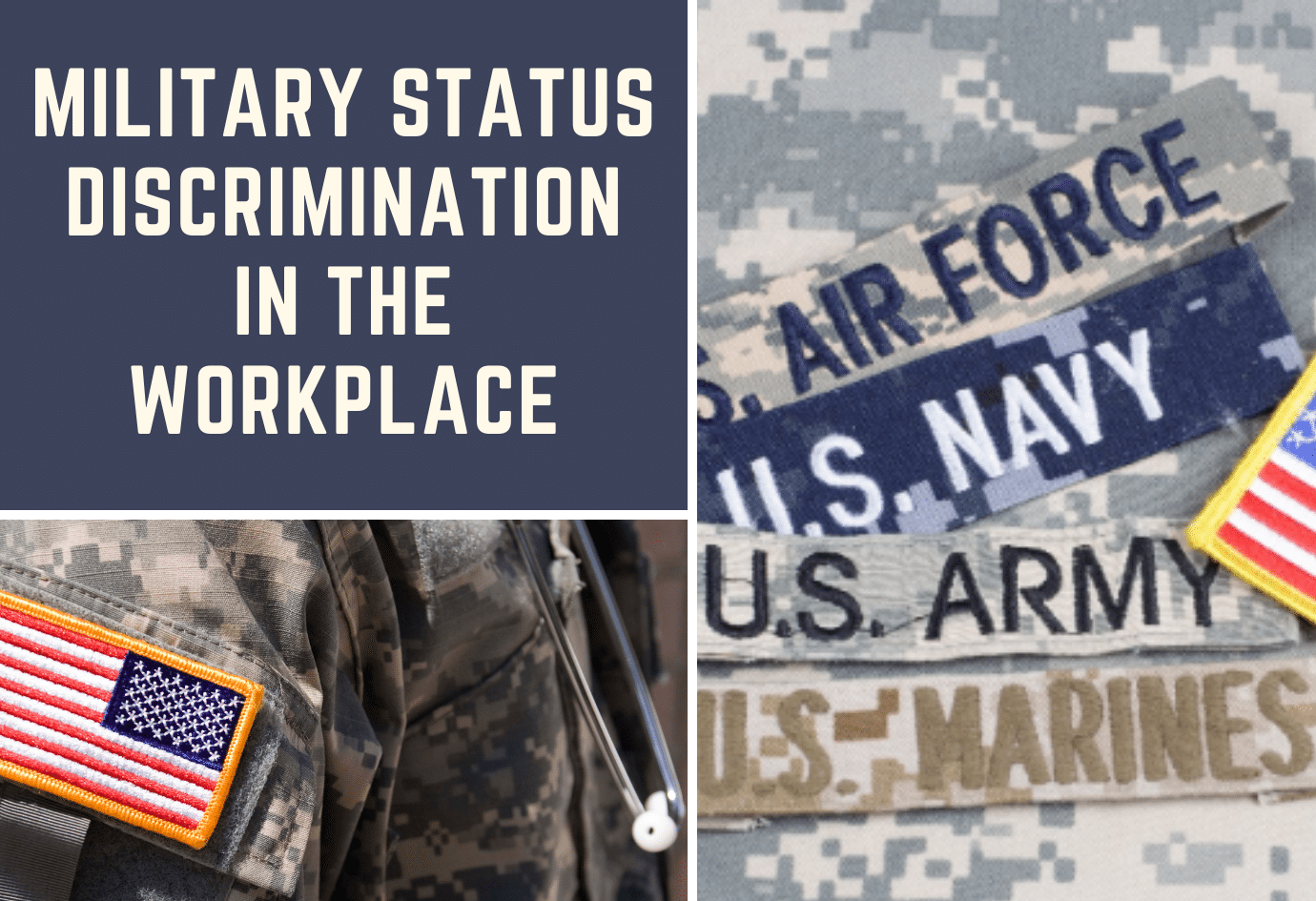
The Fee Is Free Unless You Win.
Top Rated Employment Law Firm
Protecting Families Since 1995
$400 Million Won
TABLE OF CONTENTS
Military status discrimination is illegal under both federal and state laws. Military status discrimination laws prohibit discrimination based on an employee’s past, present, or future military service. Military personnel put their lives on the line every time they suit up to go to work. Their one job is to protect us and our freedoms. Yet, many employers conveniently forget the sacrifice that people currently or previously in the military make.
Instead, employers often look at the bottom line. They treat many in the military, especially in the reserves, as a burden instead of the heroes they are. If your employer discriminates against you as a military member, you need an attorney that can help you stand up for your rights. You deserve a discrimination lawyer that respects you and your service to our country. Your lawyer should stand by your side as your advocate, helping you fight for your rights as an employee.
Military status refers to veterans, current military personnel, reservists, members of the National Guard, and family members of current military personnel.
Employers discriminate based on military status when they deny a chance for an equal employment opportunity to an individual because of their past, current, or future military status or obligation in the uniformed or armed services.
It can also result in the refusal to reinstate employment, refusal to promote military service members, harassment, or other forms of veteran status discrimination. It can even result in the denial of FMLA leave for military members and their family members learning to readjust to life with a deployed family member.

In a society with parades for military heroes when they come home, it seems odd for an employer to negatively target veterans and military members. Yet, it happens in the workplace more often than you would think.
Examples of Military Status discrimination may include:
The Uniformed Services Employment and Reemployment Rights Act (USERRA) was enacted in 1994. Its sole purpose is to prohibit employers from refusing employment to veterans and active military personnel. Under USERRA, veterans and active military personnel qualify for employment protection under the following circumstances:
If you meet these conditions, you are entitled to the following:
This law also protects veterans and active military members from harassment and discrimination based on military status.
The Family and Medical Leave Act (FMLA) protects family members of people in the military. Under the FMLA, you have the right to use up to 26 weeks of unpaid time off to care for a spouse, child, or next of kin who has been seriously injured in the line of duty. This benefit is also known as Military Caregiver Leave.
You also have the right to take up to 12weeks of unpaid leave because your family member has been called to active duty. This Qualifying Exigency Leave is meant to provide you with the opportunity to:
The Vietnam Era Veterans Readjustment Assistance Act and the Americans with Disabilities Act Amendments Act prohibit employers from discriminating against veterans who have a disability.
Finally, many state laws include military status as a protected class under their state-wide employment discrimination laws. As a result, employers, their staff, and nonemployees cannot harass, discriminate against, or retaliate against employees or job applicants who are or were members of the military or related to members of the military.
If you are the victim of military status discrimination under USERRA, you can file a complaint in one of two places:
USERRA does not expressly have a time limit to file your complaint. However, the standard set by some courts has been four years to file a complaint.
Complaint about Military Status Discrimination Under the FMLA: If you wish to file a complaint under the Family and Medical Leave Act, you may file the claim with the Secretary of Labor or the federal court within three years of the incident.
You can file claims for disability discrimination with the Equal Employment Opportunity Commission within 180 days of the incident. However, if you file in a state with a state-wide disability anti-discrimination claim, the EEOC provides you with 300 days to file your claim.
Many states with military anti-discrimination laws set their own statute of limitations to file your claim for employment discrimination and harassment based on military status. Contact an employment discrimination lawyer to help you determine the laws best suited for your claim. They can ensure you file your charge within the proper time limit under the law.
No two military discrimination claims are the same. However, many may follow similar paths. Before your attorney files a military discrimination claim with the courts or governing agency, they may attempt to negotiate a settlement with your employer. If your employer agrees, the claim can settle in as little as a few months.
However, many times, employers will not agree to negotiate until after the claim gets filed. Settlement negotiations can occur throughout the entire litigation process. The settlement can occur anywhere from a few months to several years into the process.
Sometimes, your employer will insist the case goes to trial. The case may take several years until the court enters a final judgment.
A dedicated discrimination lawyer can help negotiate your claim throughout the entire process. With your attorney’s help, your case can settle sooner rather than later as long as your employer is willing to meet and negotiate a fair and equitable settlement.
When your employer practices military status discrimination, you have a right to recover damages. The courts will gladly provide remedies for military members and their families when their jobs violate their rights. You may request your employer pay for your out-of-pocket expenses, lost wages, pain, and suffering, and emotional distress.
You may also ask for relief, such as the reinstatement of your job and changing company policy. Contact a dedicated employment discrimination lawyer to help you draft your demand letter for the courts to get the relief you deserve.
Discover how our expertise has helped clients overcome their legal challenges and achieve successful outcomes.
View All TestimonialsDuring the time that I really needed a good counselor and I was approaching different attorneys unfortunately before they heard the problem they were demanding a retainer fee. A friend of mine introduced me to the Derek Smith Law Group and I was very fortunate to be answered by Matt Finkleberg who was very polite and understanding and gave me a lot of confidence without asking for any fees in f... Read Full Testimonial
Matt Finkleberg is by far the best attorney I’ve ever hired!
Matt Finkelberg is an outstanding attorney. It was a pleasure to have him represent me for my employment case. He was very easy to talk to. He was very supportive and knowledgeable throughout the whole process. He explained the entire process to me and kept me informed every step of the way. Matt fought diligently throughout my case to make sure my case was represented best. I am very gratef... Read Full Testimonial
Matt Finkelberg is a top notch lawyer. He is very easy to talk to and truly cared about me as his client. He definitely earned my trust and confidence in his capabilities to represent me in the most professional respects. I give Matt and his firm the Derek Smith Law Group my highest recommendation to anyone who is seeking legal help for employee/employer related matters.
Matt Finkelberg is a life saver. During this whole process not only did I have a great lawyer but I also made a great friend. Matt was very attentive to my case, and mental health. Matt helped me during probably the darkest time of my life and for that I am forever grateful to have came across the Derek Smith law group. As a past client, I 100% recommend Matt Finkleberg. Matt provides a safe sp... Read Full Testimonial
It was a pleasure to have Casey represent and help me for my employment case. It was my first time needing an attorney, so I was a bit apprehensive at first – Casey took the time to answer all of my questions and fully explain everything to me, which really put me at ease. He was very attentive, supportive, and knowledgeable throughout the whole process – Casey would ask questions to ensure... Read Full Testimonial
matt is an excellent attorney. he handled my case with the utmost care and highly exceeded all expectations. i could not recommend derek smith and esp. matt finkelberg enough
It was a pleasure to have Casey represent and help me for my employment case. It was my first time needing an attorney, so I was a bit apprehensive at first – Casey took the time to answer all of my questions and fully explain everything to me, which really put me at ease. He was very attentive, supportive, and knowledgeable throughout the whole process – Casey would ask questions to ensure... Read Full Testimonial
You will be in great hands at this firm! Alyssa the managing paralegal is an absolute professional who excels at what she does. You can tell she truly cares about providing the best service possible, and is passionate about helping her clients. With Alyssa at the helm, this firm is a top-notch choice for anyone seeking assistance. Highly recommend!
Matt Finkelberg is Amazing and Devotional! It was a pleasure to have Matt represent me for my employment case. He was very attentive, supportive, and knowledgable throughout the whole process. Whenever I reached out he responded promptly which I greatly appreciated. Matt fought diligently and hard throughout my case to make sure my case was represented best. Thank you again Matt for everything.... Read Full Testimonial
Olivia is absolutely outstanding! She understands the emotional side of your case while being able to find the legal aspects of holding the employer accountable for breaking the law! Made a really terrible situation a little easier by explaining everything and helping me get everything in order and in the right hands. I would not use anyone else! Call them for any sexual harassment case... You ... Read Full Testimonial
Our dedicated attorneys are ready to fight for your workplace rights and ensure justice!
Immigration discrimination can be devastating. You may feel like you are not only fighting for your job but fighting for your legal right to live and work in the United States. Many times, victims are angry, humiliated, and frightened. You may feel like you do not have any rights or wonder where to even begin to fight for the rights you thought you had.
An immigration and employment discrimination lawyer understands your employment rights relating to your citizenship status. They can guide you through the process of creating your claim to ensure you highlight your rights and the violations that occurred, including any forms of illegal immigration status, such as calling ICE as a form of retaliation.
Furthermore, they can stand as your advocate, ensuring your voice is heard against people who would rather you did not have a voice at all. They will ensure your claims, answers, and filings all get filed within the timelines allowed by law. They will ensure you get the compensation you deserve.
You have put your life on the line to protect our country and our freedoms. If your employer chooses to punish you or your family for this act of courage, the Derek Smith Law Group’s experienced attorneys can help.
Did You Experience Discrimination, Retaliation, or Termination in the Workplace Because of Your or Your Family Member’s Military Status? Please Ask Us Your Questions at 800.807.2209 or derek@dereksmithlaw.com.

Our experienced legal team provides reliable services in key U.S. cities, ensuring expert assistance for workplace discrimination and employment law matters wherever you are located.
 New York City
New York City
 New Jersey
New Jersey
 Philadelphia
Philadelphia
 Miami
Miami
 Los Angeles
Los Angeles
 San Francisco
San Francisco
 San Diego
San Diego
 Washington DC
Washington DC
Our experienced employment lawyers are dedicated to resolving your workplace rights concerns with expertise and care.